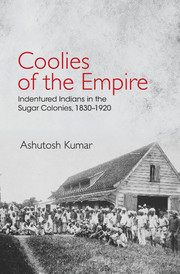Book contents
- Frontmatter
- Dedication
- Contents
- List of Figures and Maps
- List of Tables
- Preface
- Abbreviations
- Maps
- 1 Introduction: Indentured Emigrants in the Literature
- 2 Naukari, Network and Indenture
- 3 Regulating Indenture
- 4 The Journey
- 5 Agriculture and Culture between Two Worlds
- 6 Writing the Girmitiya Experience
- 7 The End of the Indenture System
- 8 Conclusion
- Appendices
- Glossary
- Bibliography
- Index
7 - The End of the Indenture System
Published online by Cambridge University Press: 28 February 2018
- Frontmatter
- Dedication
- Contents
- List of Figures and Maps
- List of Tables
- Preface
- Abbreviations
- Maps
- 1 Introduction: Indentured Emigrants in the Literature
- 2 Naukari, Network and Indenture
- 3 Regulating Indenture
- 4 The Journey
- 5 Agriculture and Culture between Two Worlds
- 6 Writing the Girmitiya Experience
- 7 The End of the Indenture System
- 8 Conclusion
- Appendices
- Glossary
- Bibliography
- Index
Summary
Introduction
Mobilization against the indenture system began as soon as it came into its own in early 1830s. Humanitarians and others, who were associated with the British abolitionist movement, labelled the indenture system as ‘A New System of Slavery’ and raised their voices against it. They maintained their position until the 1870s, but the system continued with various modifications despite their protests. By the first decade of the twentieth century, Indian nationalists were using the indenture system to criticize colonial rule and organized a campaign for the abolition of the system. This chapter explores the nationalist discourse on indentured emigration and the ways in which Indian nationalists molded their criticism of the system to fit the imperatives of the anti-colonial movement and the elitist and caste bias of some of the Indian nationalist leaders. It argues that the question of indentured Indians did not become a key issue of concern until the first decade of the twentieth century, and a meaningful campaign generated only in the second decade of the twentieth century. By exploring the various dimensions of this nationalist campaign against indentured emigration as it was carried out in the public sphere, including its incorporation into the wider anti-colonial agenda, and the centrality of women in the anti-indenture emigration campaign, it will argue that the overall exploitative nature of the system was a secondary concern in a nationalist discourse that mobilized the question of indenture for wider political purposes.
M. K. Gandhi, the Indian National Congress (INC) and Indian Political Rights in South Africa
The pre-history of the Indian nationalist movement's campaign against indentured emigration was associated with the experience of Indians in South Africa. South Africa was a British colony to which both a large number of indentured labourers and a good many of ‘free’ Indian traders and merchants had emigrated. These trading communities belonged prominently to Gujarat, Bombay and Madras. They ranged from shopkeepers and hawkers to prosperous merchants.
- Type
- Chapter
- Information
- Coolies of the EmpireIndentured Indians in the Sugar Colonies, 1830–1920, pp. 205 - 240Publisher: Cambridge University PressPrint publication year: 2017
- 1
- Cited by



